Table of Contents
- 1 Navigating Heating Pool Technologies: A Comprehensive Guide
- 2 The Compelling Reasons for Heating Pools
- 3 Decoding Different Types of Pool Heaters
- 4 How to Choose the Best Type of Heating Pool Technology
- 5 Heating Pool Technologies
- 6 Inground Pool Heating Solutions
- 7 Above-Ground Pool Heating Solutions
- 8 Get the Most Out Of Your Pool with a Pool Heater
Welcome to our comprehensive guide on optimizing your swimming pool experience through the addition of a pool heater. We’ll delve into the many benefits of installing a swimming pool heater and explain the different types of heating pool technologies. It is important to understand how each type of pool heating technology works and how much it will cost. Dive into the details with us to determine the best type of heater for your inground or above-ground pool. The Swimming Pool Store will help you elevate your pool experience to new heights with the perfect pool heating solution tailored to your needs and preferences.
The Compelling Reasons for Heating Pools
As the seasons change, so do our desires for outdoor enjoyment. Imagine basking in the refreshing waters of your pool not just during the scorching summer days but extending that joy into the cooler seasons. The secret lies in the addition of a pool heater, a game-changer that opens up a world of possibilities for aquatic enthusiasts. Here are two compelling reasons why you should consider incorporating a pool heater into your backyard oasis.
Start Your Summer Early
Starting your swimming season early is a key advantage of pool heaters with the ability to kick off your summer well before the warm weather officially arrives. By investing in a reliable pool heating system, you can transcend the limitations of seasonal temperature fluctuations. Imagine enjoying the soothing waters of your pool as early as spring, creating unforgettable moments with family and friends. This not only maximizes the utility of your pool but also adds months of enjoyment to your backyard retreat.
There are many warm spring days in the New England area, and if it weren’t for the cold nights and cold water, we might open our pools earlier than usual. Adding a pool heater in Connecticut allows you to open up as least a month early so you’re already floating around clear, warm water on the first hot day, about the time your neighbors are opening their pool.
Extend Your Swimming Season

A pool heater isn’t just about starting summer early; it’s about extending the joy of swimming well into the autumn months. A swimming pool heater becomes the gateway to an extended swimming season. Embrace the opportunity to relish the therapeutic benefits of your pool, even when the air carries a chill. By maintaining optimal water temperature, you transform your pool into a haven that can be enjoyed more than just a few fleeting months.
The addition of a pool heater transcends the conventional boundaries of seasonal pool use. It grants you the freedom to create lasting memories and relish the pleasures of swimming beyond the confines of summer.
Decoding Different Types of Pool Heaters
The key to getting the most out of your extended pool time lies in choosing the right heating solution for your aquatic haven. Understanding the different types of pool heaters is crucial in making an informed decision that aligns with your preferences and needs.
There are basically three main categories of pool heaters: Gas, Electric, and Solar, although each type has variations like gas and propane or electric and heat pump. Learn what these definitions mean and how to evaluate the costs for operation and determine what’s best for you. Solar typically works better in climates with a lot of sunlight and without harsh winters, like the southern states. In Connecticut, most pool owners choose a type of gas or electric heater.
The Swimming Pool Store carries quality gas and electric heaters, including propane and electric heat pumps. We can further explain the different types of technology and systems for heating pools and help you choose the best type of pool heater to meet your needs.
How to Choose the Best Type of Heating Pool Technology

Choosing the right type of pool heater is a pivotal decision that directly impacts your swimming experience. There are advantages of both gas and electric pool heaters, and The Swimming Pool Store can assist you in making an informed decision. Learn more about the difference between gas and electric pool heaters to help you choose the right technology for your specific needs. There are unique characteristics, advantages, and considerations associated with each type. Pool owners should consider the efficiency, cost-effectiveness, and environmental impact to determine which option aligns best with their pool requirements and personal preferences.
Additionally, your local climate plays a crucial role in determining the most efficient type of pool heater for your specific needs. In colder climates, such as Connecticut, gas or propane heaters may be more suitable, providing effective heating even in chilly conditions. By considering your pool size, location, and climate, you can make an informed decision to ensure your pool heater aligns seamlessly with your requirements.
Heating Pool Technologies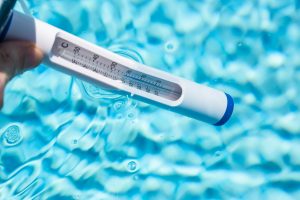
In Connecticut’s seasonal climates, optimizing your swimming pool experience necessitates an efficient heating method due to a limited warm season. The Swimming Pool Store provides consultations, assisting in the selection of the most energy-efficient pool heater for an extended swimming season. Understanding the available heating pool technologies, including gas pool heaters, electric and heat pumps, and solar pool heaters, empowers informed decision-making based on factors such as energy efficiency and cost estimates.
Gas Pool Heaters
Gas pool heaters offer swift and efficient water heating and can be installed in both above-ground and inground pools. These heaters operate using either natural gas or propane, dependent on energy content and distribution preferences. Ideal for regions with four distinct seasons, like Connecticut and other Northeastern states, gas pool heaters prove invaluable when heating pools quickly is essential.
Technology:
Gas pool heaters utilize either natural gas or propane to heat pool water. These heaters have a combustion chamber where the fuel is burned, and the heat generated is transferred to the pool water.
How It Works:
- Fuel Combustion: Natural gas or propane is burned in a combustion chamber.
- Heat Transfer: The heat generated is transferred to the pool water as it circulates through the heater via the pump.
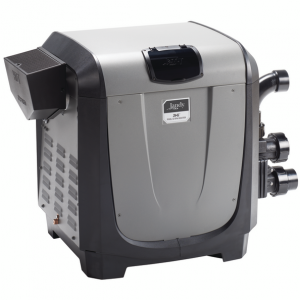
- Temperature Control: Gas pool heaters have built-in temperature controls to maintain the desired pool water temperature.
Pros:
- Quick Heating: Gas pool heaters can rapidly increase the water temperature, which is ideal for those wanting immediate warmth.
- Suitable for All Climates: Effective in various climates, including colder regions.
- Independence from Ambient Temperature: Unlike heat pumps, gas heaters are not affected by outside air temperature.
Cons:
- Operational Cost: Typically more expensive to operate compared to some alternative heating methods. .
- Environmental Impact: Burning fossil fuels contributes to carbon emissions.
- Limited Efficiency: While modern models are more efficient, they still waste some energy.
Costs:
- Installation: Initial costs include the purchase and installation of the heater.
- Operating Costs: Gas heaters generally have higher operational costs compared to other heating methods. The Department of Energy (DOE) offers more information on how you can determine the efficiency of a gas pool heater, which is based on the ratio of usable output to energy input. This means that a heater that states 80% efficiency uses $80 worth of useful heat for every $100 worth of fuel.
Recommended Brands:
- Hayward: Offers energy-efficient gas heaters like the H-Series, available in natural gas and propane with low emissions and savings with reduced run time.
- Jandy offers a range of top-tier commercial and residential pool equipment, including the Jandy JXI™ energy-efficient gas swimming pool heater that is compact and easily installable on most pool pads. The Jandy JXI pool heater prioritizes high energy efficiency and seamlessly integrates with various existing systems. Owners enjoy automation and control anytime from anywhere.
- Pentair: Known for high-efficiency models like the MasterTemp series. The Pentair Mastertemp pool heater features an energy-saving function that diverts the water flow when heating is not required and can provide up to 35% in annual cost savings. It also comes with smart connectivity for control anywhere, anytime.
Considerations:
- Energy Efficiency: Look for models with high-efficiency ratings.
- Size: Choose the right size based on pool volume for optimal performance.
- Maintenance: Regular maintenance is crucial for efficiency and longevity.
Leading brands such as Pentair and Jandy are renowned for their high-efficiency gas pool heaters and do a great job at heating pools reliably for an extended swimming season. For Connecticut pool owners, a gas swimming pool heater becomes a versatile solution, enabling early-season pool opening and extended pool use beyond the typical closing period. Those who install these heaters often find themselves wondering why they didn’t do so sooner, relishing an extended and much-enjoyed swimming season.
Propane Pool Heaters
Propane pool heaters are a quick and versatile option for heating pool water, but their operational costs and environmental impact should be considered. Selecting a reputable brand and consulting with a pool professional can aid in choosing the right propane heater for your specific needs.
Technology:
Propane pool heaters operate similarly to gas heaters, utilizing propane as the fuel source. They have a combustion chamber where propane is burned to generate heat, which is then transferred to the pool water.
How It Works:
- Propane Combustion: Propane is burned in a combustion chamber.
- Heat Transfer: The generated heat is transferred to the pool water as it circulates through the heater via the pump.
- Temperature Control: Propane pool heaters have controls to regulate and maintain the desired pool water temperature.
Pros:
- Quick Heating: Propane heaters provide rapid warming of pool water.
- Independence from Ambient Temperature: Like gas heaters, propane heaters are not affected by outside air temperature.
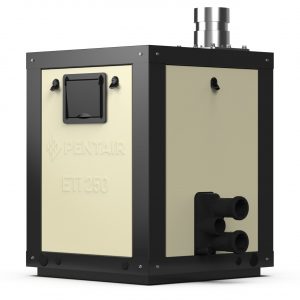
- Versatility: Suitable for various pool sizes and climates.
Cons:
- Operational Cost: Propane is generally more expensive than natural gas, which can lead to higher operational cost.
- Environmental Impact: Burning propane contributes to carbon emissions.
- Fuel Storage: Requires a propane tank, which may need refilling.
Costs:
- Installation: Initial costs include the purchase and installation of the heater.
- Operating Costs: Propane heaters have ongoing operational costs influenced by propane prices.
Recommended Brands:
- Pentair: Renowned for efficient propane models like the MasterTemp series.
Considerations:
- Energy Efficiency: Look for models with high-efficiency ratings.
- Size: Choose the right size based on pool volume for optimal performance.
- Maintenance: Regular maintenance is essential for efficiency and durability.
Pentair propane pool heaters deliver high-performance and high-efficiency options to elevate your swimming experience. The affordability of heating pools with a propane pool heater might surprise you, especially when leveraging additional strategies like using a solar cover. This combination not only ensures cost-effectiveness but also contributes to environmental conservation by reducing energy consumption.
Factors such as energy efficiency, heating capacity, and compatibility with existing systems should be taken into account. Investing time in understanding these considerations allows you to make an informed decision, ensuring that your pool heater not only meets but exceeds your expectations.
Electric Pool Heaters vs. Heat Pumps
Electric heaters and heat pumps are two popular choices for heating pools. While electric heaters may not match the energy efficiency of gas heaters or electric heat pumps, they find their niche in certain applications. Specifically designed for small aboveground pools, spas, or compact inground pools with less than 15,000 gallons, electric heaters offer a practical heating solution for more modest aquatic spaces.
In situations where installing a gas line or propane tank is impractical or inaccessible, an electric heater becomes the sole viable option for some pool owners. It’s important for those seeking an energy-efficient pool heating solution to distinguish between an electric pool heater and a pool heat pump, carefully evaluating the advantages and disadvantages of each.
Electric Pool Heaters:
Technology: Electric pool heaters utilize electric resistance heating elements to generate heat. The process involves passing an electric current through these elements, which produces heat that is transferred to the pool water.
How It Works:
- Electric Resistance: The heating elements, usually made of metal, heat up as an electric current passes through them.
- Heat Transfer: The heated elements transfer the heat to the pool water circulating through the heater.
- Temperature Control: Electric pool heaters come with controls to regulate and maintain the desired pool water temperature.
Pros:
- Affordability: Generally, electric heaters have lower upfront costs.
- Simple Installation: They are relatively easy to install.
- Suitable for Small Pools: Effective for smaller pool sizes.
Cons:
- Higher Operational Costs: Electric heaters can be more expensive to operate, especially when heating larger pools.
- Environmental Impact: Electricity generation may contribute to carbon emissions depending on the power source.
- Slower Heating: Compared to gas, electric heaters might take longer to heat the pool.
Costs:
- Installation: Lower upfront costs compared to gas or heat pumps.
- Operating Costs: Can be higher due to electricity rates.
Heat Pump Swimming Pool Heaters:
Technology: Heat pumps operate by extracting heat from the air or ground and transferring it to the pool water. They work on the principle of refrigeration, using a compressor and refrigerant to absorb and release heat.
How It Works:
- Air or Ground Heat Extraction: The heat pump draws in air or heat from the ground.
- Refrigerant Cycle: The heat is absorbed by a refrigerant and compressed, raising its temperature.
- Heat Transfer: The heated refrigerant passes through a coil, transferring heat to the pool water.
- Temperature Control: Heat pumps include controls to regulate and maintain the desired pool water temperature.
Pros:
- Energy Efficiency: Heat pumps are more energy-efficient at heating pools compared to electric resistance heaters.
- Environmentally Friendly: They produce fewer carbon emissions compared to gas heaters.
- Suitable for All Climates: Work efficiently in various climates.
Cons:
- Higher Initial Cost: Heat pumps typically have higher upfront costs.
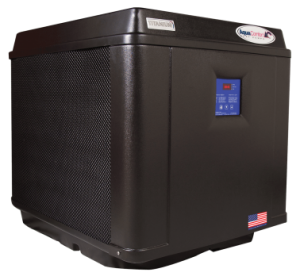
- Dependence on Ambient Temperature: Performance may be affected in colder climates.
- Longer Heating Time: Heat pumps might take longer to heat the pool compared to gas heaters.
Costs:
- Installation: Higher upfront costs compared to electric heaters.
- Operating Costs: Generally lower compared to electric resistance heaters. Learn more about heat pump operating costs depending on your climate from the DOE.
Recommended Brands:
- Jandy: Known for efficient and durable heat pump models like the Jandy JE Series.
- Pentair: Offers reliable and energy-efficient heat pumps, including the UltraTemp series.
- Aquacomfort: Aquacomfort Heat Pumps offer not just warmth but cutting-edge technology and total comfort control for your swimming pool. Aquacomfort pool heat pumps not only excel in cost efficiency but also boast a remarkable longevity advantage. On average, these innovative and reliable pool heat pumps provide about twice the life expectancy of traditional fossil fuel pool heaters.
Solar Heating Pool Systems
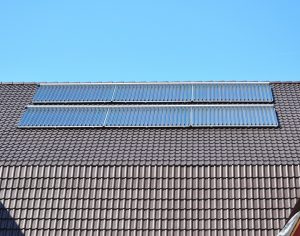
Embracing a sustainable and eco-friendly approach to pool heating, solar pool heaters utilize the sun’s abundant energy to efficiently warm your pool water. The system is designed to seamlessly integrate with your existing pool setup, offering a cost-effective and energy-efficient solution. Benefits of solar pool heating include reduced operating costs and a minimized environmental impact.
Using a solar cover is recommended no matter what type of other pool heating system is used. A solar blanket holds heat in at night and helps to prevent evaporation, and makes other systems not have to work as hard at heating pool water.
Technology:
Solar heating pool systems harness energy from the sun to warm the pool water. They consist of solar collectors, typically mounted on the roof or a ground structure, through which pool water is circulated and heated by solar energy.
How It Works:
- Solar Collector Absorption: The solar collectors, often made of durable materials like plastic or rubber, absorb sunlight.
- Water Circulation: Pool water is pumped through the solar collectors, where it absorbs heat.
- Return to Pool: The heated water is then returned to the pool, raising its temperature.

Pros:
- Renewable Energy Source: Solar heaters use abundant and renewable energy from the sun.
- Low Operating Costs: Once installed, solar heaters have minimal ongoing operating costs.
- Environmentally Friendly: They produce no emissions during operation.
Cons:
- Weather Dependence: Performance is influenced by sunlight, making them less effective on cloudy days.
- Higher Initial Cost: Solar heaters can have higher upfront costs, including installation.
- Space Requirement: Adequate space for solar collectors is necessary.
Costs:
Installation: Higher upfront costs, including the purchase of solar collectors.
Operating Costs: Generally low, as they rely on sunlight. Learn more from the DOE about estimating the efficiency and calculating the annual costs of operating a solar pool water heater.
Inground Pool Heating Solutions
Understanding the diverse options for inground heating pool systems is crucial in selecting the most suitable and efficient method for your specific needs. Creating an oasis in your backyard with an inground pool is a luxury, but maximizing your enjoyment often requires efficient heating solutions. It serves as a gateway to a prolonged aquatic experience in the comfort of your own backyard.
Factors to consider when selecting an inground pool heater include:
- Pool size
- Local climate
- Installation costs
- Ongoing operational expenses
- Natural sun exposure
You also want to think about how you use your pool; if you want to maintain a steady temperature or have the water heat up quickly. Learn more about how to determine the best method for heating your inground pool, and contact The Swimming Pool Store with any questions.
Above-Ground Pool Heating Solutions

Creating a cozy retreat with an above-ground pool in your backyard is a delightful addition to any home. To maximize your swimming experience, especially during cooler seasons, efficient heating is key.
Considerations when choosing a heating pool solution for above-ground pools include:
- Pool size
- Local climate
- Installation Costs
- Ongoing and operational expenses
- Natural sun exposure
Heat pumps are often an efficient method of heating an above-ground pool, depending on the factors listed above.
Installing a swimming pool heater is one of the most popular swimming pool renovations and will extend your swimming season in comfort.
Learn more about the possibilities of incorporating Swimming Pool Automation Systems, from pool robots to automated pool pumps, filters, lighting, and pool heating systems.
Get the Most Out Of Your Pool with a Pool Heater
Choosing the right type of pool heater is a pivotal decision that directly impacts your swimming experience. Consider how you intend to use your heater. Are you aiming for a consistent temperature throughout the year, or do you prefer quick heating during specific weeks? If a steady temperature is your priority, an electric pool heater may be the ideal choice. On the other hand, if you only need to heat the pool for a few months or if a solar blanket provides sufficient warmth, a gas heater might be the more suitable option. By carefully assessing your needs and preferences, you can make a purchase decision that aligns perfectly with your pool heating requirements.
Contact The Swimming Pool Store to schedule your pool heater consultation and let the transformation begin! We’ll help you determine the best heating method and explain the pros and cons of each pool heater type. The Swimming Pool Store offers the best brands and more than 50 years of experience in heating pools.

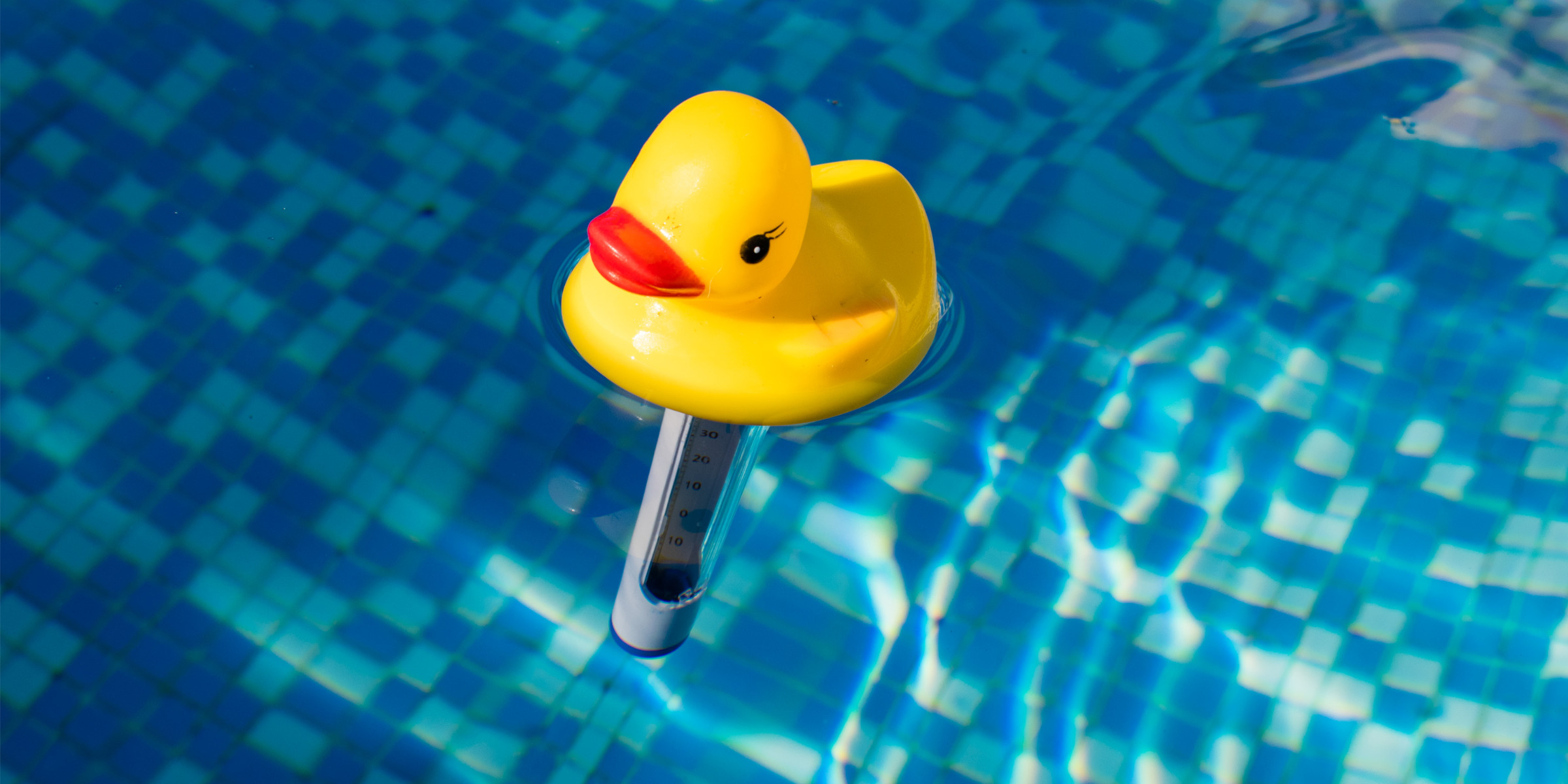
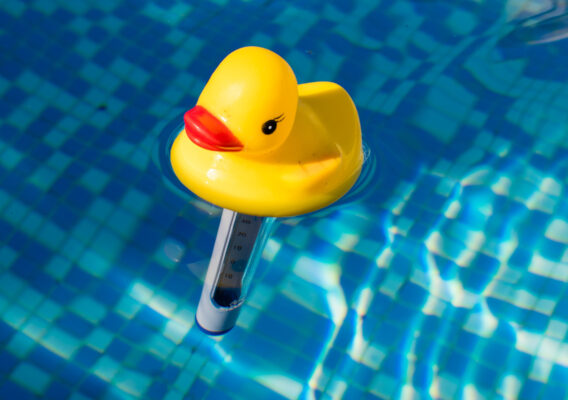
 Navigating Heating Pool Technologies: A Comprehensive Guide
Navigating Heating Pool Technologies: A Comprehensive Guide